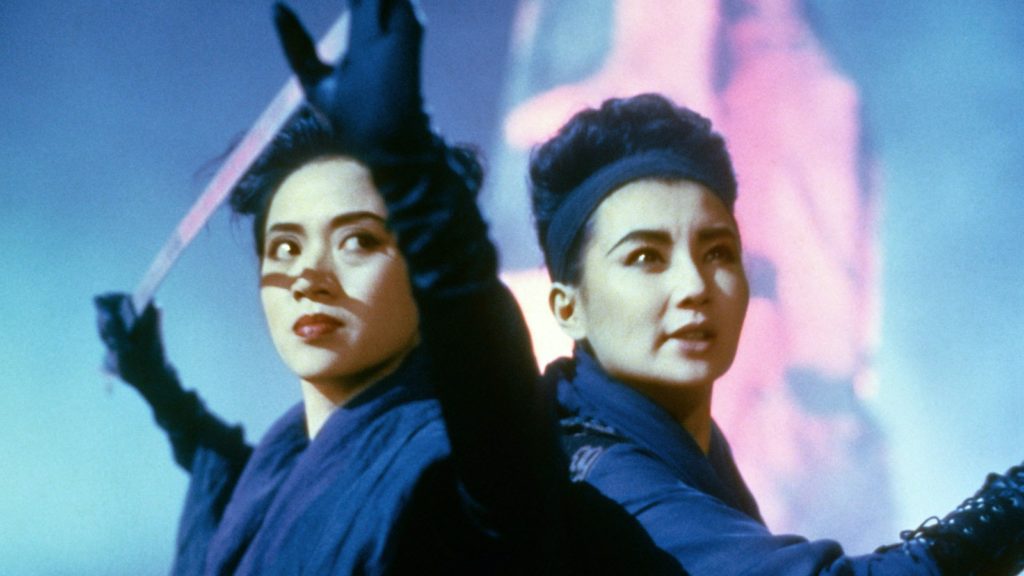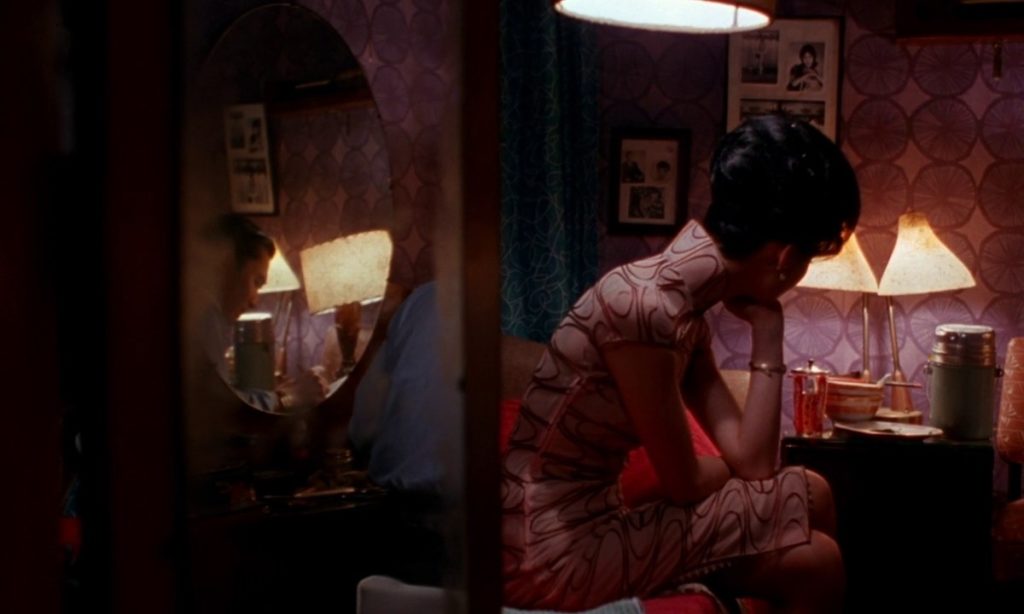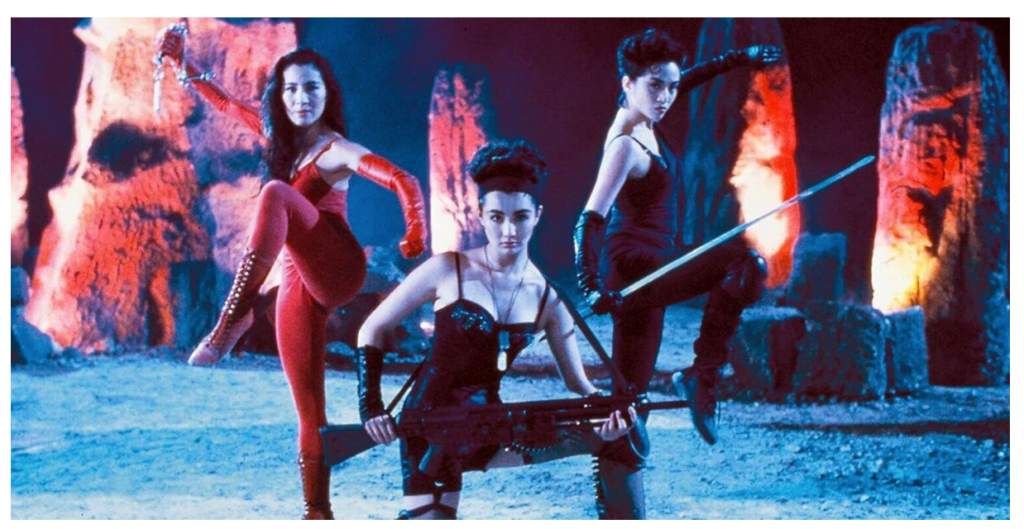| Azra Thakur |

The Heroic Trio plays at the Trylon Cinema from Sunday, May 14 through Tuesday, May 16. Visit trylon.org for tickets and more information.
I watched my first Maggie Cheung film, In the Mood for Love (2000), near the start of the pandemic at home. I didn’t read too much about it beforehand (the best way to watch films—but please do read Casey’s reflection for Perisphere) and was mesmerized as Cheung appeared scene after scene in print after gorgeous print of cheongsams alongside her co-star, Tony Leung. Though I hadn’t seen them in films before, Cheung and Leung were clearly stars—the camera watched their every move and expression closely as they interact in their apartments, on stairways, in restaurants alongside each other. Here were the everyday moments of interaction that had been abruptly put on pause early in the pandemic—the connections with others that we longed for but could not have. I bought the soundtrack on eBay and listened to it on repeat working from home, letting its memorable sounds soothe my own grief.

Maggie Cheung in In the Mood for Love.
“Who is Maggie Cheung?” I wondered afterwards. A Google search indicated she had acted in a couple of films after In the Mood for Love, but nothing more recently. A 2004 New York Times Magazine profile, “Why Isn’t Maggie Cheung a Hollywood Star?,” described her at the time as a successful, well-recognized actor in Hong Kong, highly visible on billboards and in advertisements across the country. The writer is awestruck with Maggie’s beauty and charm as she spends time with her in Toronto and Hong Kong, trying to understand why she hadn’t become a star in the United States. Cheung was a star in Hong Kong, and later in her career acted in French productions like Irma Vep. Cheung explains that the kinds of Hollywood, or “Western,” roles she was offered had little appeal as they were often stereotypical, secondary Asian characters, far removed from the leading roles and artistry she enjoyed while working with filmmakers like Olivier Assayas and Wong Kar-wai: “Shown a script for X2: X-Men United a few years back, she declined to pursue it, uninterested in the film itself. ‘If I start making films like that, they won’t be proud,’ she said. ‘I’d feel like I was cheating.'”
Hollywood wasn’t ready for Cheung’s talent in 2004. While the landscape for Asian characters in Hollywood has improved since then—Minari and The Farewell come to mind as recent smaller, independent films; Crazy Rich Asians and Everything Everywhere All At Once as films that achieved wider mainstream success. While these recent films featured many Asian American actors, they have yet to be catapulted to the type of stardom that Cheung enjoyed in Hong Kong over twenty years ago. Movie Stardom in 2023 feels different from the early 2000s—celebrities on billboards were more indelible, capturing eyeballs easily for attention. In today’s social media landscape, anyone with an online account can showcase their talent and sell products. In consuming far more images and content than we did twenty years ago, stardom seems smaller for actors.
The 2004 profile sheds light on some of the challenges Cheung experienced that may have led her to stop acting: limiting, stereotypical roles in Hong Kong and Hollywood, the challenges of being a well-recognized celebrity in Hong Kong, and the emotional toll of inhabiting her characters’ lives. If In the Mood for Love was released today (could it be released today is another question altogether), would it have been successful in the United States? Would Cheung have received better offers for the kinds of roles she wanted to play? Or would she have made the same decision to step away from acting again in today’s celebrity landscape?

I saw a young Maggie Cheung in The Heroic Trio (1993) just recently for this Perisphere post, an action movie featuring three women solving kidnappings the police are unable to address. Cheung is electric again on camera, this time with a louder personality and another memorable wardrobe. It’s a brash look: Cheung is wrapped in leather jackets, bustiers, and leggings while zipping around on a motorcycle. The film is less moody and more the kind of physical, acrobatic action perfected in Hong Kong films. Three women working together to save babies: it holds up well today. The film was a hit when it was released in Hong Kong and led to a sequel, Executioners (also released in 1993—Hong Kong filmmaking was fast-paced).
In addition to Cheung, The Heroic Trio stars Anita Mui and a young Michelle Yeoh. Looking back from today, each actor had different career trajectories that couldn’t have been predicted. Anita Mui was a singer in Hong Kong before turning to acting, and passed away in 2003. Michelle Yeoh successfully transitioned from the Hong Kong film industry to Hollywood, winning the Oscar for best actress in Everything Everywhere All at Once this year. Cheung and Yeoh both experienced career highlights in 2000 with In the Mood for Love and Crouching Tiger, Hidden Dragon (Yi Yi was also released in 2000—what was going on for us to be gifted with so many wonderful films that year?).
Crouching Tiger, Hidden Dragon was the rare non-Hollywood, non-English film widely released in the United States. I remember seeing it at the Plaza Maplewood with my grandmother, who was visiting at the time. I was too young for a driver’s license—my mom dropped us off and picked us up when it was over. It was the first time I’d watched a film that wasn’t in English in a theater, and the only film I ever watched in the theater with my grandmother. I was just as mesmerized watching Yeoh flying through the air in the theater as I was mesmerized watching In the Mood for Love for the first time by myself at home alone. How do you describe the feeling of lighthearted joy whey you watch a film that completely delights you? When the sight of an actor in a film transports you back in time to another beloved memory? Yeoh’s surprise appearance in The Heroic Trio brought me back in time: memorable films can come from anywhere and be from any time.
While Cheung stepped away from acting, Yeoh continued her career, eventually finding mainstream success in Hollywood—she is clearly a star, and had been one long before the recognition she received through the Oscar this year. Reflecting on Cheung’s New York Times Magazine profile, I wonder how Yeoh felt about the roles she was offered and accepted along the way, if she felt proud of her work. How important is the question of being a movie star in Hollywood today?
Edited by Olga Tchepikova-Treon
